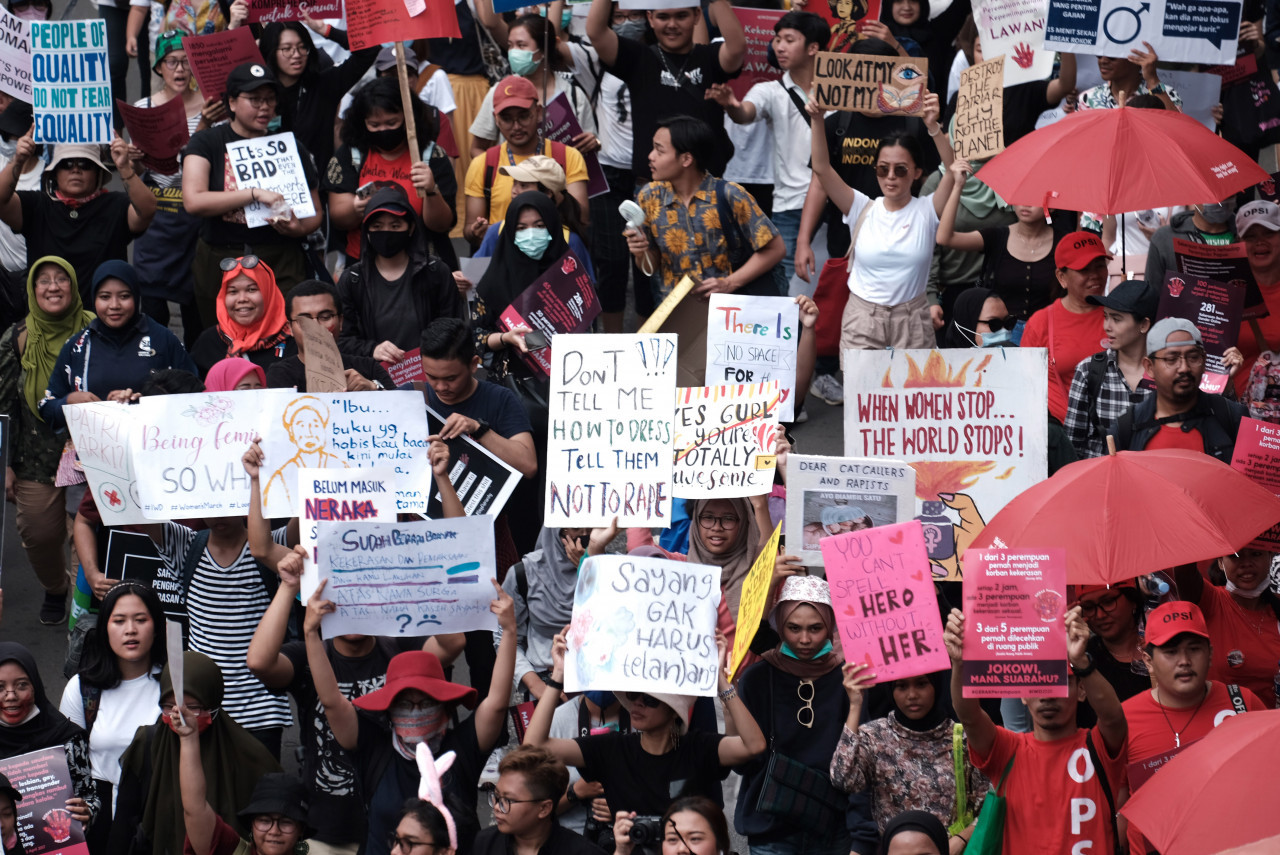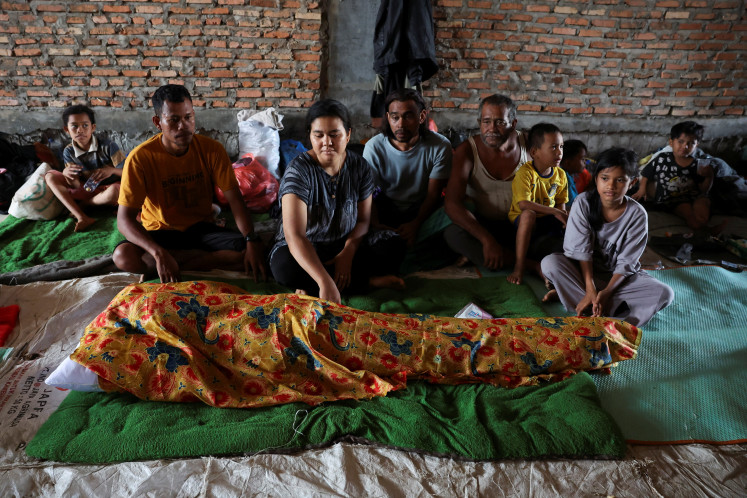Popular Reads
Top Results
Can't find what you're looking for?
View all search resultsPopular Reads
Top Results
Can't find what you're looking for?
View all search resultsNo to ‘Manels’, yes to gender equality in Sweden, Indonesia!
So true, while you might not be hungry, even being wealthy is not a guarantee that you will experience gender justice.
Change text size
Gift Premium Articles
to Anyone
C
an you imagine a world populated just by men? Would it simply be full of beer, cars, sports and violence, and where no one would keep the toilet seat down? It would be full of machismo, power plays, and, in the long run, self-extinction, unless these men could invent a fun way to procreate among themselves. At least there would be no mansplaining!
But some supposedly smart men – who call themselves intellectuals – seem to think that an all-male world is the ideal. Or at least an all-male panel discussion. Or a book written by a man, on men. Or all these things combined.
An online discussion about a book called Fragmen Sejarah Intelektual (Fragments of Intellectual History), which contains the profiles of 17 men arbitrarily chosen by the author, Ignas Kleden, occurred on Jan. 27. The discussant was a man, as well as the keynote speaker and even the moderator. Testosterone overdose, anyone?
I sent the author of Fragmen a list of women figures, contemporaries of the men he discussed, who contributed equally to the nation. He admitted he was not a feminist. I replied, you don’t have to be, you just need to be an Indonesian and a human being.
About one and a half months later, on International Women’s Day, an initiative was launched by Cameron MacKay, the Canadian ambassador, to pledge to only participate in panels that include women. Thirty-nine other ambassadors in Jakarta and three directors general from the Foreign Ministry joined in the pledge.
At the beginning of the year, Valerie Julliand, the United Nations resident coordinator, had proposed the “No Manel Pledge” which was in fact a worldwide UN initiative (see “Foreign envoys in Jakarta pledge to end all-male discussions”, The Jakarta Post, March 8).
“‘Manels’ do not represent the diversity of the world we live in and deprive us of a more holistic, innovative and insightful perspective on any given discussion or topic … They are manifestations of sexism and exclusion, which may reinforce the gendered stereotype of men commanding authority or superior expertise, even when there are equally – if not more – qualified women whose contributions are undervalued or left out,” Julliand said in a statement on Jan. 14.
Can you imagine when Sweden, a land famed for its high gender equality, conducts a webinar? You can bet they would be a stickler for gender balance with regard the speakers.
So when, on March 4, the Swedish Embassy in Jakarta conducted a webinar on gender equality in the workplace as a means to economic recovery post COVID-19, you can bet there was gender balance. With the catchy title “Her Rights! Money, Power, Autonomy”, it featured five speakers: three women and two men (bit.ly/herrightsidwebinar).
Opening the webinar, Swedish Ambassador Marina Berg pointed out how the pandemic affected women and girls the most, amplifying existing inequalities. But while the female population are the hardest hit, they also hold the solution to economic recovery. Furthermore, “gender equality is about people, human rights, democracy, justice and opportunities, and about the three Rs: rights, representation and resources,” she said. Right on!
Lena Ag, the first speaker, is the director-general of the Swedish Gender Equality Agency. She spoke about the most important reforms concerning gender equality in the labor market and in social policy in Sweden, also in the context of the pandemic.
It was good to know that, despite Sweden being one of the richest countries in the world as measured by gross domestic product, Swedish women have also been adversely affected by the pandemic. As in Indonesia, women in Sweden have a less secure place in the job market, work more in the informal sector, have a bigger share of domestic responsibilities and are also subjected to increased violence, especially domestic violence, during the pandemic.
The second speaker was Rina Zoet, a successful businesswoman in real estate, with a master's degree in Gender Studies from the University of Indonesia. She believes that, for recovery and sustainability, the focus should not just be the workplace, but also the marketplace and community. With regards gender, as with overcoming problems from the pandemic and environmental degradation, there should be collaboration on the national, regional and global levels.
Faizol Reza, the third speaker, chairs Commission VI of the House of Representatives overseeing trade, industry, investment, cooperatives and small and medium enterprises and state-owned enterprises. A former 1998 activist who was kidnapped and tortured, and now a state official, he brought a down-to-earth approach to the webinar, admitting that various government policies had failed to include a gender equality perspective despite the fact that Pengarusutamaan Gender (PUG – Gender Mainstreaming) had been enacted in 2000 and all state institutions were obliged to implement it. Patriarchal habits die hard, huh?
The fourth speaker was Diva Yohanna, store manager of IKEA, which was an opportunity to see how Swedish gender equality is practiced in Indonesia. From her account of her seven years of working at IKEA, it certainly seemed to be the case.
Last but not least was Jamshed Kazi, head of UN Women, whose presentation, “Closing the Gender Equality Gap in ASEAN and Indonesia”, provided a regional perspective on the problem. He also suggested a way to bring more men to the table, essential if there is to be any real change. A simple way would be not to include “gender”, let alone “feminism”, in the title of a discussion, but sneak gender issues and perspectives in!
Given all the webinars available online in these COVID-19 days, how is this webinar different? The selection of speakers for one – from the private sector, state agencies and the UN – which provided an interesting mix of views. Nevertheless, there was a common thread: Injustice. Secondly, it took on the issue from an economic angle, arguing that we simply cannot afford not to be gender equal.
The Swedish ambassador made a few closing remarks. What struck me like an arrow to the heart was the statement that “no living woman in the world, has ever experienced full gender equality”. So true, while you might not be hungry, even being wealthy is not a guarantee that you will experience gender justice.
So from the simple act of pledging to refuse manels, to committing to gender equality in the workplace, it benefits us all. Gender inclusion provides richness and diversity to the discussion, and empowering women at work benefits everyone. And if it helps to recover from the pandemic-induced recession, well, what are we waiting for?
***
The writer is the author of Sex, Power and Nation.










